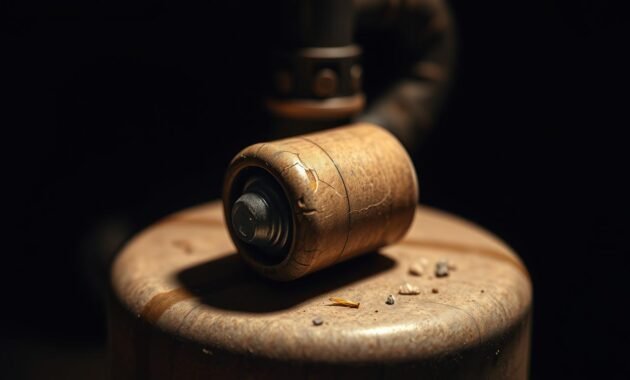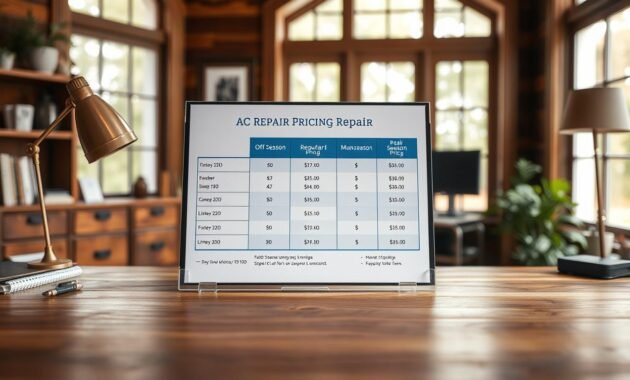Are you worried about the cost of replacing an air conditioner capacitor? Most homeowners dread unexpected AC repairs. A failing capacitor can leave you sweating in the summer heat, causing frustration and system breakdown.
I’ll explain everything you need to know about AC repair costs for capacitor replacement. We’ll cover typical expenses and factors that affect pricing. This guide will help you understand HVAC system maintenance without spending too much.
Understanding AC Capacitors and Their Function
As an HVAC pro, I’ve learned how vital capacitors are for air conditioning. These small parts are key to keeping your home cool and comfy when it’s hot.

A capacitor acts like a temporary battery for your AC system. It gives the electrical boost needed to start and run AC motors. HVAC contractors count on them for smooth system operation.
Key Roles in Air Conditioning Systems
The dual run capacitor has several roles in your AC unit:
- Provides initial power surge to start compressor motors
- Maintains consistent electrical current during operation
- Helps regulate motor speed and performance
- Supports overall energy efficiency
Read also: Goodman AC Unit Capacitor
Types of AC Capacitors
Different capacitors have specific jobs in your cooling system:
| Capacitor Type | Primary Function |
|---|---|
| Start Capacitor | Provides initial power boost to start motors |
| Run Capacitor | Maintains consistent motor operation |
| Dual Run Capacitor | Manages both compressor and fan motor functions |
Importance of Proper Capacitor Operation
If a capacitor fails, your AC system can stop working. Regular checks by HVAC pros can prevent breakdowns. This keeps your system running efficiently.
Knowing about these small but important parts helps keep your cooling system reliable all year.
Average Air Conditioner Capacitor Cost Breakdown
Homeowners should know the costs of replacing an air conditioner capacitor. I’ve looked into the usual prices to guide you. This way, you’ll know what to expect when you need this repair.
Read aslo: Symptoms of Low Freon in Central Air Conditioners
The cost usually has two parts: the price of the parts and the labor. Here’s what you might see:
- Capacitor part costs: $20 – $120
- Labor costs for repair services: $100 – $180
- Total replacement expense: $120 – $300
Several things can change the final cost. The type of AC unit, the capacitor’s specs, and local labor rates all play a role. HVAC pros usually charge $75 to $150 an hour for these repairs.
It’s wise to get quotes from several trusted services. Things that can affect the price include:
- How complex the AC system is
- The brand and type of capacitor needed
- Local labor rates
- How urgent the repair is
While DIY might seem appealing, hiring a pro is safer and ensures the system works right. Spending on quality repair services can save you money later by avoiding more damage.
Factors That Impact Replacement Costs
Understanding what affects the cost of replacing air conditioning capacitors is key. It helps you save money on energy bills. Several important factors influence the total cost of replacing your AC capacitor.
Let’s look at the main factors that can change your capacitor replacement costs:
Capacitor Type and Size Considerations
The size and type of capacitor are critical in determining costs. HVAC companies look at several things:
- Unit size and capacity
- Specific electrical requirements
- Voltage specifications
- Single vs. dual capacitor designs
Brand and Quality Differences
Not all capacitors are the same. The brand and quality greatly affect both the initial cost and long-term performance. High-quality brands might be pricier but offer:
- Better durability
- Extended lifespan
- Enhanced energy efficiency
- Improved overall system performance
Geographic Location Influence
Your location can greatly impact replacement costs. Different areas have different labor rates, climate challenges, and market conditions. Urban areas usually have higher service charges than rural areas. Local HVAC companies adjust prices based on:
- Regional climate demands
- Local competition
- Cost of living variations
- Seasonal service requirements
Knowing these factors helps you plan and manage your air conditioning system maintenance costs better.
Signs of a Failing AC Capacitor

When your air conditioning system starts acting up, the blower motor might be trying to tell you something important. A failing capacitor can cause numerous performance issues that shouldn’t be ignored during ac repair.
Recognizing the warning signs early can save you from costly system breakdowns. Here are the key indicators that your capacitor isn’t functioning correctly:
- Delayed or difficult system startup
- Unexpected system shutdowns
- Strange humming noises from the unit
- Inconsistent cooling performance
- Frequent circuit breaker tripping
The capacitor isn’t just a small component – it’s critical for your AC’s operation. When it begins to fail, you might notice your air conditioner struggling to start or completely refusing to turn on. A persistent humming sound often indicates the capacitor is working overtime but cannot effectively start the motor.
Visual symptoms can include visible swelling or bulging of the capacitor, which suggests internal damage. If you spot these signs, it’s time to consider professional ac repair before a minor issue becomes a major system failure.
Ignoring these warning signs can lead to more expensive repairs or complete system replacement. Regular maintenance and quick response to performance changes can help extend your air conditioning system’s life and prevent unexpected breakdowns.
Professional Installation vs DIY Considerations
Many homeowners think about fixing an AC capacitor themselves or getting help from HVAC contractors. It might seem easy, but there are important things to think about. These include your safety, how well the system works, and warranty issues.
Choosing a professional for the job has big benefits. The dangers of trying to fix it yourself can be much worse than saving money.
Safety Concerns
AC capacitors hold a lot of electricity, which is very dangerous. Even if the system is turned off, they can cause serious harm. HVAC experts have the right tools and training to stay safe.
Technical Requirements
Fixing a capacitor is more than just replacing a part. Technicians need to:
- Discharge electrical charge safely
- Check if the capacitance and voltage are right
- Make sure the whole HVAC system works well
- Install and connect everything correctly
Warranty Implications
Most makers won’t honor warranties if you fix it yourself. HVAC pros can:
- Keep the warranty valid
- Offer service guarantees
- Keep records of the repair
| DIY Approach | Professional Service |
|---|---|
| High personal risk | Trained safety protocols |
| Potential system damage | Comprehensive system check |
| Voided warranty | Warranty preservation |
Even though DIY might seem cheaper, the risks are too high. Most people should choose professional installation for their safety and system’s health.
Different Types of Capacitor Costs
When looking at ac capacitor replacement costs, it’s key to know the different types. Not all capacitors are the same. Their prices change a lot based on their function and design.
Run capacitors and start capacitors are two main types. Here’s what makes them different:
- Start Capacitors:
- Used briefly during motor startup
- Lower initial cost
- Need more frequent replacements
- Run Capacitors:
- Designed for continuous operation
- Longer life expectancy
- Higher upfront investment
Capacitor prices usually range from $10 to $100. This depends on your HVAC system’s needs. Dual run capacitors, which handle more loads, cost more.
Several things affect capacitor costs:
- Electrical capacity
- Brand quality
- Voltage rating
- Physical size
Talking to an HVAC expert is a good idea. They can help find the best capacitor for your system. While cost matters, a good capacitor can save you money in the long run.
When to Replace Your AC Capacitor
Knowing when to replace an AC capacitor is key for keeping your air conditioning running well. As a homeowner, I’ve learned that timing is everything. Your AC capacitor doesn’t last forever. Spotting the right time for a replacement can help avoid high energy bills and system failures.
Read also: What Does Eco Mean on Air Conditioner?
HVAC companies say to watch for certain signs that mean it’s time to replace your capacitor:
- Inconsistent cooling performance
- Frequent system start-up failures
- Unusual humming sounds from the unit
- Higher than normal energy consumption
AC capacitors usually last 10-15 years. But, this can change based on how much you use it, how well you maintain it, and your environment. I always suggest getting a professional to check it regularly to catch problems early.
| Capacitor Age | Replacement Likelihood | Recommended Action |
|---|---|---|
| 0-5 years | Low | Regular maintenance |
| 5-10 years | Medium | Annual professional inspection |
| 10-15 years | High | Consider replacement |
Don’t wait until your system completely breaks down. Replacing it early can save you from costly repairs and keep your AC running smoothly. If you see any warning signs, get in touch with local HVAC companies for a professional check.
Cost Saving Tips for Capacitor Replacement
Replacing an AC capacitor doesn’t have to be expensive. As a homeowner, I’ve found ways to save money on labor costs. Working with HVAC contractors can be more affordable than you think.
Smart maintenance can cut down your costs for AC capacitor replacements. Here are my top tips for saving money:
- Schedule regular HVAC system inspections to catch issues early
- Learn basic capacitor maintenance to prevent failures
- Compare quotes from multiple hvac contractors before hiring
- Consider off-peak season replacements for discounts
Maintenance Strategies That Save Money
Preventative care is key to avoiding high repair costs. Simple maintenance routines can make your capacitor last longer. This saves you money on labor costs.
Timing Your Replacement Wisely
Planning your capacitor replacement wisely can save you a lot. Late fall or early spring are good times to replace. HVAC contractors often offer lower rates during these seasons.
Selecting the Right Service Provider
When hiring a professional, don’t just look for the cheapest option. Choose certified HVAC contractors with good warranties and clear pricing. A bit more upfront can save you money in the long run.
Pro tip: Ask about service package deals or maintenance contracts. They might lower your repair and replacement costs.
Understanding HVAC System Components and Their Costs
Exploring air conditioning systems can save you time and money. Each part is vital for a cool home in summer.
The blower motor is key in any HVAC system. It moves air around your home. It works with electrical parts like capacitors. Modern systems use many capacitors for smooth running:
- Single capacitors for individual component power
- Dual capacitors managing multiple system parts
- Start capacitors initiating system movement
Knowing the cost of HVAC parts helps with budgeting. Air conditioning systems are complex. A failing part can affect others. For example, a bad capacitor can harm your blower motor, leading to costly repairs.
| HVAC Component | Average Replacement Cost |
|---|---|
| Capacitor | $120 – $250 |
| Blower Motor | $450 – $800 |
| Compressor | $1,200 – $2,500 |
Understanding these parts and their costs prepares you for HVAC maintenance. Regular checks can prevent big problems and save money.
Seasonal Timing and Emergency Services

Timing is key when it comes to ac repair and your budget. Summer is the busiest time for hvac companies, which means higher prices. Planning ahead can help you save on air conditioning upkeep.
It’s important to know how prices change with the seasons. In summer, repairs cost more because everyone needs them. But, getting your capacitor replaced in late fall or early spring can save you a lot of money.
- Summer: Highest prices for ac repair (peak season)
- Winter: Lower demand, possible discounts
- Spring/Fall: Best times for maintenance and replacements
Emergency services are another thing to think about. HVAC companies charge more for repairs after hours. Having a maintenance plan that includes emergency coverage can help avoid big bills.
| Season | Average Repair Cost | Availability |
|---|---|---|
| Summer | $250-$500 | High demand |
| Winter | $150-$350 | Low demand |
| Spring/Fall | $200-$400 | Moderate demand |
Regular maintenance is the best way to keep ac repair costs down. By getting inspections in the shoulder seasons, you can avoid emergency repairs and save money.
Conclusion
Exploring air conditioner capacitor costs shows their vital role in your HVAC system. The cost can vary from $150 to $300, based on brand, quality, and location.
Timing and regular maintenance are key to saving money on ac repairs. Knowing when a capacitor fails and fixing it quickly can avoid bigger, more expensive problems. Regular checks by professionals can spot issues early.
It’s wise to handle HVAC maintenance with care. While DIY might seem appealing, hiring pros ensures correct installation and keeps warranties intact. Spending on quality parts and expert care might seem pricey at first. But, it saves money by making your AC last longer and avoiding sudden failures.
Being aware of air conditioner capacitor costs and upkeep is a smart move. It helps keep your home comfortable and efficient. A small investment in care can greatly improve your HVAC system’s performance and lifespan.


